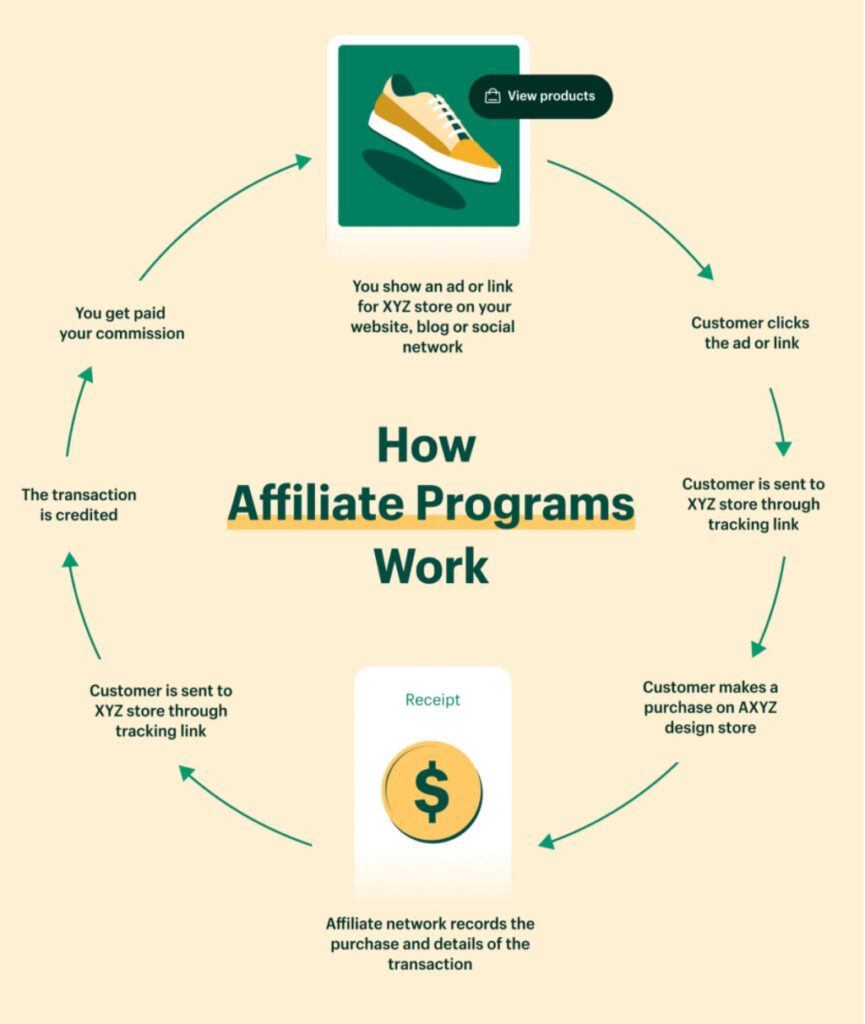Welcome to “A Beginner’s Guide to Affiliate Marketing: How to Earn Money Online”! Interested in learning how affiliate marketing works and how you can start earning money from it? Well, you’ve come to the right place!
In this article, we’ll walk you through the basics of affiliate marketing, explaining how it all works and how you can get started. From understanding the concept of affiliate marketing to finding the right affiliate programs, we’ll cover it all. By the end of this guide, you’ll have a clear understanding of how to leverage affiliate marketing to earn money online.
So, if you’re ready to dive into the world of affiliate marketing and discover how it can be a lucrative online income stream, keep reading! We’ve got all the information you need right here in this guide.

What is Affiliate Marketing?
Definition of Affiliate Marketing
Affiliate marketing is a performance-based marketing strategy where individuals, known as affiliates, earn commission by promoting products or services on behalf of a company. Affiliates are rewarded for every visitor or customer they bring to the company’s website through their marketing efforts. This form of marketing is popular because it is cost-effective for companies and provides an opportunity for individuals to earn passive income from the comfort of their own homes.
Brief History of Affiliate Marketing
Affiliate marketing has a rich history that dates back to the late 1990s when companies started to recognize the potential of using affiliate programs to increase their online sales. Amazon was one of the first companies to introduce the concept of affiliate marketing, launching their Associates Program in 1996. The program allowed website owners to earn commissions from promoting Amazon products.
Since then, affiliate marketing has evolved into a multi-billion dollar industry, with companies from various sectors, including fashion, beauty, technology, and travel, using affiliate programs to expand their customer base and increase revenue.
How Affiliate Marketing Works
Affiliate marketing works on a simple premise: a company provides affiliates with unique tracking links or codes that they can use to promote their products or services on their own platforms. When a visitor clicks on an affiliate’s link and makes a purchase or completes a specific action, such as filling out a form, the affiliate earns a commission.
The success of affiliate marketing lies in the tracking system. When a visitor clicks on an affiliate’s link, a cookie is placed on their browser, which allows the company to track the source of the referral. This ensures that affiliates are properly credited for their marketing efforts and receive the commissions they deserve.
Benefits of Affiliate Marketing
Flexibility and Remote Work Opportunities
One of the biggest advantages of affiliate marketing is the flexibility it offers. As an affiliate, you have the freedom to choose when and where you work. Whether you prefer working from home, a coffee shop, or even while traveling, affiliate marketing allows you to set your own schedule and work at your own pace.
Affiliate marketing also provides an opportunity for remote work. With the rise of digital nomadism, many people are opting for a location-independent lifestyle. Affiliate marketing allows you to earn money online, irrespective of your physical location, as long as you have access to the internet.
Low Startup Costs
Unlike traditional businesses, affiliate marketing requires minimal investment. You don’t need to create or stock products, manage inventory, or handle customer support. The only cost involved is setting up and maintaining your own platform, such as a website or a social media account. These costs are relatively low, making it affordable for anyone to start their affiliate marketing journey.
Passive Income Potential
One of the main attractions of affiliate marketing is the potential for passive income. Once you have set up your marketing strategy and built a steady stream of traffic to your platform, you can start earning money passively. Even while you sleep, your affiliate links continue to work for you, generating income for every successful referral.
Finding the Right Affiliate Programs
Researching and Choosing Niches
Before diving into affiliate marketing, it is crucial to identify your niche. A niche is a specific segment of the market that you will be targeting with your affiliate marketing efforts. Choosing a niche you are passionate about or have expertise in is important as it helps you connect with your audience and build trust.
Researching your niche involves understanding the target audience, their needs, and the products or services that can fulfill those needs. Take the time to study trends, competition, and consumer preferences to identify a profitable and sustainable niche.
Identifying Profitable Affiliate Programs
Once you have chosen your niche, it’s time to find affiliate programs that align with your chosen market. Look for programs that offer products or services that are relevant to your audience. Consider factors such as commission rates, payment terms, and the reputation of the company offering the affiliate program.
It is also essential to assess the demand for the products or services you will be promoting. Look for programs that have high conversion rates and provide valuable resources and support to affiliates, such as marketing materials, training, and dedicated affiliate managers.
Evaluating Affiliate Networks
Another option for finding affiliate programs is to join affiliate networks. Affiliate networks act as intermediaries between affiliates and companies, making it easier for affiliates to find suitable programs and for companies to manage their affiliate programs.
When evaluating affiliate networks, consider factors such as the variety of programs available, the network’s reputation, the level of support provided to affiliates, and the payment terms and methods offered. Joining an affiliate network can offer a range of benefits, such as access to a wider selection of programs, consolidated payments, and better tracking and reporting tools.
Building an Affiliate Marketing Website
Selecting a Domain and Hosting Provider
To establish your online presence, you will need to create a website. Start by selecting a domain name that reflects your niche and is easy to remember. Consider using keywords that represent your niche to improve search engine optimization (SEO).
Once you have a domain name, you will need to choose a hosting provider to host your website. Look for a reliable and reputable hosting provider that offers good uptime, fast loading speeds, and excellent customer support. Consider factors such as the hosting plans available, storage and bandwidth limitations, and server location.
Designing a User-Friendly Website
Designing a user-friendly website is essential for engaging your audience and encouraging them to stay longer. Choose a clean and professional design that complements your niche and appeals to your target audience. Make sure your website is easy to navigate, with clear menus and intuitive features.
Optimize your website for mobile devices as well, as an increasing number of users access the internet through smartphones and tablets. Responsive design ensures that your website adapts to different screen sizes and provides a seamless browsing experience.
Creating High-Quality Content
Content is king in affiliate marketing. Creating high-quality, valuable, and relevant content is crucial for attracting and retaining your target audience. Develop a content strategy that includes different types of content, such as blog posts, product reviews, tutorials, videos, and infographics.
Focus on producing content that solves problems or answers questions for your audience. Provide thorough and well-researched information, and use compelling visuals to enhance the user experience. Incorporate your affiliate links naturally within your content, ensuring that they are relevant and add value to the reader.

Driving Traffic to Your Affiliate Website
Search Engine Optimization (SEO) Strategies
Search engine optimization (SEO) plays a vital role in driving organic traffic to your affiliate website. Start by conducting keyword research to identify relevant keywords that users are searching for in your niche. Incorporate these keywords strategically within your content, meta tags, headings, and URLs.
Optimize your website’s structure and navigation to make it search engine friendly. Ensure that your website loads quickly, as page speed is an important ranking factor. Moreover, focus on building high-quality backlinks to improve your website’s authority and visibility in search engine result pages.
Content Marketing and Blogging
Blogging is an effective content marketing strategy to attract and engage your audience. Regularly publish informative and engaging blog posts that provide value to your readers. Share your knowledge, insights, and recommendations within your niche, and incorporate your affiliate links naturally within your blog content.
Promote your blog posts through social media, email marketing, and other digital marketing channels to drive traffic to your website. Engage with your audience through comments and feedback to build a sense of community and trust.
Social Media Marketing
Social media platforms provide an excellent opportunity to reach a wide audience and promote your affiliate products. Create social media accounts on platforms that align with your target audience, such as Facebook, Instagram, Twitter, or LinkedIn.
Post engaging and relevant content on your social media profiles regularly. Utilize social media features, such as live videos, stories, and polls, to interact with your audience and encourage participation. Link back to your website or specific blog posts containing your affiliate links to drive traffic and generate sales.
Optimizing Conversion Rates
Understanding Conversion Rate Optimization (CRO)
Conversion Rate Optimization (CRO) focuses on improving the percentage of visitors who complete a desired action, such as making a purchase or filling out a form. CRO involves analyzing user behavior, identifying areas of improvement, and implementing strategies to increase conversion rates.
Successful CRO involves conducting A/B tests, creating compelling and persuasive copy, optimizing landing pages, reducing friction in the user journey, and employing effective call-to-action (CTA) techniques. Continuously monitor and analyze your website’s performance and make data-driven decisions to optimize your conversion rates.
Improving Website User Experience
Providing a seamless and enjoyable user experience is key to boosting conversion rates. Ensure that your website loads quickly, is easy to navigate, and provides a pleasant browsing experience across different devices and screen sizes. Use clear and concise messaging to communicate your value proposition and guide users towards actions you want them to take.
Additionally, create engaging and persuasive product descriptions that highlight the benefits and features of the products you are promoting. Include high-quality images and videos that demonstrate the product in action and provide users with a clear understanding of what they will be purchasing.
Implementing Call-to-Action (CTA) Techniques
Effective call-to-action (CTA) techniques encourage users to take action, such as making a purchase or signing up for a newsletter. Use compelling and action-oriented language in your CTAs to create a sense of urgency and motivate users to complete the desired action.
Experiment with different CTA placements, colors, and button designs to find what works best for your audience. A well-designed CTA should stand out from the rest of the content, be easily clickable, and clearly communicate the benefits users will receive by clicking.

Analyzing and Tracking Performance
Monitoring Key Metrics and KPIs
To measure the success of your affiliate marketing efforts, it is important to monitor key metrics and key performance indicators (KPIs). Some essential metrics to track include website traffic, conversion rates, average order value, click-through rates, and revenue generated.
Regularly review these metrics to identify trends, patterns, and areas for improvement. Analyze the performance of different affiliate programs, products, and content types to optimize your marketing strategy and allocate resources effectively.
Utilizing Tracking Tools and Software
Tracking tools and software can greatly simplify the process of monitoring your affiliate marketing performance. Affiliate networks often provide tracking tools that offer detailed reports on clicks, conversions, and commissions generated through your affiliate links.
You can also leverage third-party tracking tools, such as Google Analytics or affiliate marketing plugins, to gain deeper insights into your website’s performance. These tools provide valuable data on user behavior, traffic sources, and conversion paths, allowing you to make informed decisions to optimize your marketing efforts.
A/B Testing Strategies
A/B testing involves comparing two versions of a webpage or element to determine which one performs better in terms of user engagement and conversion rates. By testing different elements, such as headlines, CTAs, colors, or layouts, you can identify the most effective strategies to maximize conversions.
Implement A/B tests systematically, making one change at a time and tracking the results carefully. This iterative approach allows you to make incremental improvements to your website and marketing materials, resulting in better performance over time.
Managing Relationships with Affiliate Programs
Negotiating Commission Rates
Once you have established a successful relationship with an affiliate program, you may have the opportunity to negotiate commission rates. As your website grows and your marketing efforts prove effective, companies may be open to offering you higher commission rates to incentivize your continued promotion of their products or services.
Engage in open and transparent communication with the affiliate managers, highlighting the value you bring to their program and the quality of conversions you are generating. Negotiate commission rates that reflect the effort and impact you are making as an affiliate marketer.
Communicating with Affiliate Managers
Maintaining a good relationship with affiliate managers is essential for a successful affiliate marketing journey. Affiliate managers can provide valuable insights, tips, and resources to help you optimize your marketing strategy and increase your earnings.
Regularly communicate with affiliate managers, sharing updates on your marketing activities and seeking their input and guidance. Be prompt in responding to their inquiries and requests, and demonstrate your dedication and professionalism as an affiliate partner.
Building Trust and Rapport
Building trust and rapport with your audience is fundamental to becoming a successful affiliate marketer. Establish yourself as an authority within your niche by consistently providing valuable and reliable information. Be transparent about your affiliate relationships and disclose your involvement when promoting products or services.
Engage with your audience through comments, emails, and social media interactions. Address their concerns and provide solutions to their problems. By building trust and rapport, you can cultivate a loyal audience that trusts your recommendations and is more likely to make purchases through your affiliate links.

Avoiding Common Affiliate Marketing Pitfalls
Overpromoting or Misrepresenting Products
It can be tempting to overpromote products to maximize your earnings, but this can lead to a loss of trust from your audience. Avoid bombarding your audience with excessive promotional content and misleading claims. Instead, focus on genuinely recommending products or services that you believe will benefit your audience.
Thoroughly research the products you promote to ensure their quality and relevance to your audience. Test the products yourself whenever possible to provide honest and accurate reviews. By maintaining integrity and ethics in your marketing efforts, you will build credibility and long-term success.
Ignoring Legal and Regulatory Requirements
Affiliate marketing is subject to various legal and regulatory requirements, depending on your jurisdiction. It is essential to familiarize yourself with the laws and regulations that apply to your specific industry, including disclosure requirements, privacy laws, and advertising guidelines.
Be transparent with your audience about your affiliate relationships by clearly disclosing your involvement and any potential conflicts of interest. Ensure that your marketing materials and website comply with copyright laws and intellectual property rights. By staying informed and adhering to legal and regulatory obligations, you can protect yourself and your business reputation.
Failing to Stay Updated with Industry Trends
The world of affiliate marketing is constantly evolving, with new trends, technologies, and strategies emerging regularly. Failing to stay updated can lead to missed opportunities and stagnant growth.
Stay informed about the latest industry trends by reading industry publications, following influential marketers and thought leaders, and participating in relevant forums and communities. Continuously educate yourself and adapt your marketing strategies to align with changing consumer preferences and emerging technologies.
Conclusion
Affiliate marketing offers an exciting opportunity to earn money online, whether as a side hustle or a full-time career. With its low startup costs, flexibility, and potential for passive income, it is an accessible path for beginners looking to enter the world of online business.
By understanding the fundamentals of affiliate marketing, conducting thorough research, building a user-friendly website, driving targeted traffic, optimizing conversion rates, analyzing performance, cultivating relationships with affiliate programs, and avoiding common pitfalls, you can set yourself up for success in this dynamic and lucrative industry.
Remember, affiliate marketing is not a get-rich-quick scheme. Consistency, dedication, and a genuine desire to help your audience are key to building a sustainable affiliate marketing business. So, embark on your affiliate marketing journey, learn from your experiences, and enjoy the fulfillment and financial rewards that come with it. Best of luck!




